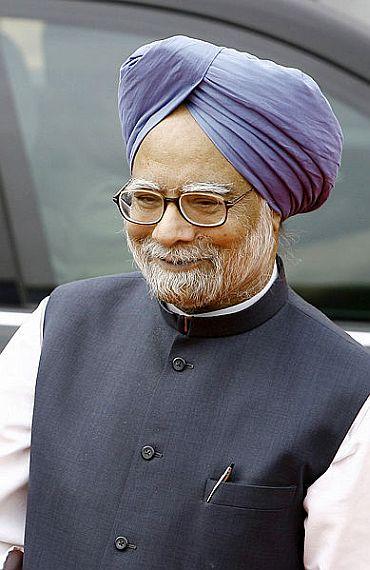This article was first published 15 years ago
Home »
News » Virendra Kapoor on the Prime Minister
Virendra Kapoor on the Prime Minister
Last updated on: September 13, 2010 18:54 IST
Image: Prime Minister Manmohan Singh
Photographs: Ricardo Stuckert/Wikimedia Commons
Virendra Kapoor claims there are people who believe that behind the prime minister's goody-goody exterior lurks a calculating man plotting each move carefully in order to emerge on top of every situation.Prime Minister Manmohan Singh is an honourable man, squeaky clean financially, though many of his foes and former associates questioned his intellectual honesty due to his capacity to rationalise socialist controls and market freedoms depending on the exigencies of the situation at hand.
As an economic bureaucrat, he rose fast to become a full secretary to the government, due to his ingrained habit of keeping on the right side of ministerial and administrative bosses.
A former teacher at the Delhi School of Economics, he left his peers in the academic world far behind, attaining new heights, first in the bureaucratic hierarchy and later in the political world.
Aside from a stroke of immense good fortune, Dr Singh clearly had certain other characteristics, which facilitated his rise to the prime minister's post.
The most notable trait in his mental make-up, which played a vital role in his rise to the top is his ability to convince his interlocutors about his lack of ambition, his self-effacement.
In short, an ability to project an unthreatening persona.
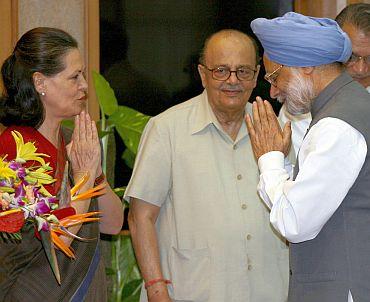
Image: Congress chief Sonia Gandhi greets Dr Singh as senior party leader Arjun Singh looks on
Photographs: B Mathur/Reuters
That was why Congress President Sonia Gandhi singled him out for the prime minister's post in preference to far more clued-up practitioners of realpolitik like Pranab Mukherjee and Arjun Singh to relatively younger leaders like P Chidambaram.
Thus, the image of a non-politician politician has served Dr Singh's cause rather well.
Admittedly, he carried that image of a non-politician with him to the prime minister's office.
So, even as he sits in the prime ministerial '
gaddi', the dirty job of mustering the numbers in Parliament so that the government can win the vote on the nuclear deal, or using the Central Bureau of Investigation to soften up hard-core politicians like Lalu Prasad and Mulayam Singh, or exploiting gubernatorial offices to sack inconvenient governments or to install convenient ones, is left to professional politicians in the Congress party.
The latest: The blame for appointing a tainted bureaucrat as the Central Vigilance Commissioner is not put on 'Teflon' Singh.
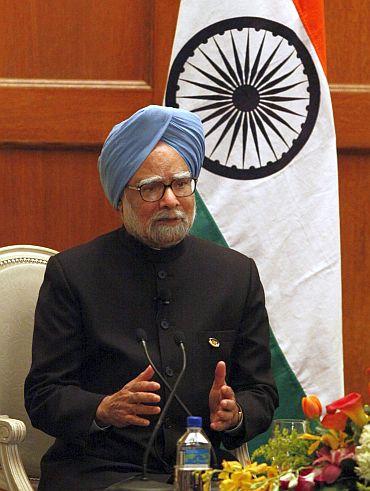
Image: Dr Singh addresses a news conference
Photographs: Richard Clement/Reuters
Thus, whatever the situation, our man always succeeds in giving the impression that he did not soil his hands in the dirty business that is everyday, pragmatic party politics.
is always above the fray, always innocent.
Why is one psychoanalysing Manmohan Singh, and why now?
Well, the prime minister's interaction with a group of editors last Monday has caused most Delhi politicos to turn into amateur mind readers.
Though the media has surprisingly sought to downplay the import of his remarks, senior politicians, especially in the ruling Congress party, are engrossed in dissecting his each word to espy Dr Singh's real intentions.
There are even hints that 10, Janpath's establishment has not taken kindly to his far-from-innocent remarks, especially when he is known to weigh his words most carefully and is not given to empty talk.
Therefore, the dynasty loyalists have taken umbrage at the fact that Dr Singh failed to make a public gesture of volunteering to step down in favour of the crown prince.
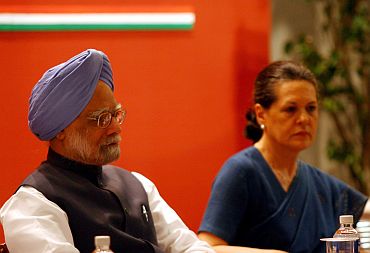
Image: Dr Singh and Sonia at an awards ceremony in New Delhi
Photographs: B Mathur/Reuters
Remember that in his first and only formal press conference during the United Progressive Alliance's second term three months ago, he countered a suggestion from a reporter about retiring.
'No, I am not quitting. I have a job to do and I am committed to do it,' was his response.
Ideally, the sycophantic lot that finds admittance to the sanctum sanctorum at 10, Janpath would have liked him to say that he was always willing -- at this very moment -- to make way for Rahul Gandhi.
Now the courtiers complain that Dr Singh was so ungrateful that he refused to acknowledge the existence of the prime minister-in-waiting and blame it on the usual politics of intrigue and subterfuge that informs internal Congress dynamics.
Three months later, Dr Singh seems to have excelled himself, comparing self, albeit by implication, to the totem of the 'family' and, again by implication, coming out trumps.
In the process, he exonerated himself of any blame for his government's monumental failures.
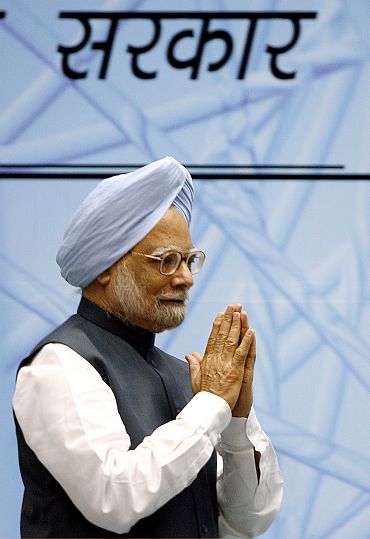
Image: Dr Singh said his Cabinet was more cohesive than Nehru's or Indira Gandhi's Cabinets
Photographs: B Mathur/Reuters
Sample some of the remarks he made while talking to the editors. (Why and how the senior journos chose to suppress them, while one of them most unprofessionally highlighted off-the-record remarks with regard to China, is in itself a story worth probing by a media columnist.)
Asked about the almost daily display of differences between ministers, our Superman PM said that his Cabinet has functioned with a greater degree of cohesion than the Cabinet under Jawaharlal Nehru, where there were daily differences and exchange of letters between Sardar Vallabhbhai Patel and Panditji.
And in Indira Gandhi's Cabinet, when Morarji Desai was the deputy prime minister, journalists could go from one Cabinet minister to another and hear different kinds of stories. 'That I say is not happening (
in my government),' he said.
Mild-mannered Congressmen not given to reading selfish motives in the PM's words could not help exclaim, 'Oh! Really?'
Actually, anyone familiar with the current state of affairs would laugh at Dr Singh's claim.
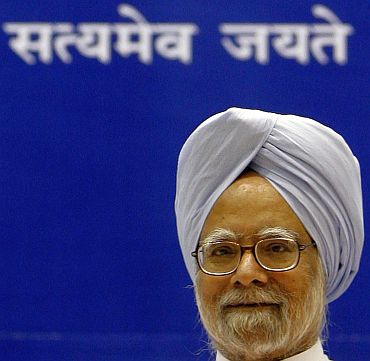
Image: Dr Singh speaks at a New Delhi event. The sign behind reads 'Truth Alone Triumphs'
Photographs: B Mathur/Reuters
Indeed, one would have to assign a new meaning to the word 'cohesion' if one finds any evidence of ministerial harmony in Railway Minister Mamata Banerjee holding the government to ransom, or Highways Minister Kamal Nath ridiculing Planning Commission boss Montek Ahluwalia or Environment Minister Jairam Ramesh crossing swords with Agriculture Minister Sharad Pawar and Aviation Minister Praful Patel over Bt Brinjals and the Navi Mumbai airport respectively, or Congress leader Digvijay Singh mocking Home Minister P Chidambaram's anti-Maoist campaign.
In the same vein, Dr Singh sought to make light of the current crisis in Kashmir, pointing out that it is a complex problem that has defied solution for many years.
Much more enlightened leaders like Nehru and Indira Gandhi and Rajiv Gandhi have worked at it, but had failed to resolve it. Indeed, he added for good measure that he was not a magician who would 'produce rabbits out of my hat to solve the 60-year-old problem'.
Aside from the fact that he was at pains to counter the charge of non-performance, nay, of being a weak prime minister, he sought to elevate himself above the level of former Congress prime ministers.
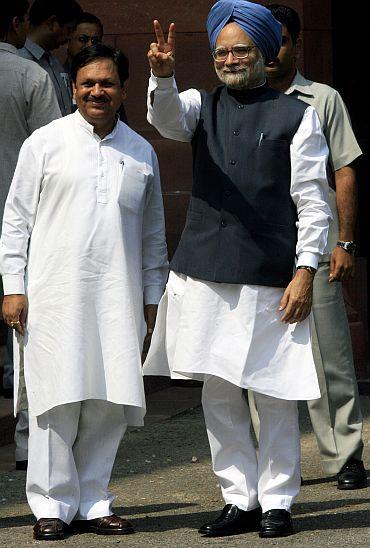
Image: Dr Singh outside Parliament
Photographs: B Mathur/Reuters
Significantly, he omitted the name of the one prime minister who had pulled him out of retirement and made him finance minister and, thus set him up on the journey to the prime minister's office.
That prime minister's name is P V Narasimha Rao.
Rao has not got his due either from the Congress dynasty or from Dr Singh who, at least, ought to have known better than to allow the momentous contribution of his benefactor to go unacknowledged.
Since his meeting with the editors, Congressmen have buttonholed journalists to find out Dr Singh's 'exact words' in order to read the import of his remarks and to fathom his game plan for the future. No, one is not exaggerating.
There is a great deficit of trust between the prime minister and the Sonia Gandhi-led party, a major reason for the UPA-II government's non-performance.
Now, contrary to the general impression that he is a mild-mannered man devoid of any personal ambition, there are those who are convinced that behind that goody-goody exterior lurks a calculating man plotting carefully each move in order to emerge on top of every situation.
Looking at his long career graph, beginning with an adviser's post in the commerce ministry back in the late 1960s to the office of the prime minister, quite a few observers suspect him of being not all that innocent, nay, of being mealy-mouthed and clever.
As a senior Congress leader said, "He is clever at hiding his cleverness."
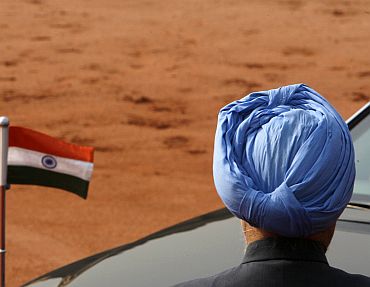
Image: Dr Singh at Rashtrapati Bhavan
Photographs: B Mathur/Reuters
Words like calculating and worldly-wise have been used to describe him.
Congress leaders and others, who have watched him grow from a very pliable bureaucrat, who did not even offer to resign at the time of the anti-Sikh pogrom, and merely offered to resign but did not press to do so when Harshad Mehta defrauded banks and millions of retail investors under his watch as the finance minister, do find significance in his boast of leading a far more cohesive government than even Nehru.
Given that Prime Minister Indira Gandhi was famously described as 'the only man in the Cabinet', Dr Singh's claim of a higher degree of cohesion in his Cabinet does sound ridiculous.
In short, he is not a modern-day 'sanyasi' ready to kick the prime ministerial chair for the sake of someone else.
Meanwhile, in a postscript, one might mention here that had Nehru heeded Patel'S well-meaning advice contained in those letters Dr Singh referred to, in all probability a number of problems we are now saddled with could well have been avoided.
Whether it was that woolly-headed 'Hindi-Cheeni Bhai Bhai' business or the surprise resurrection of the dispute in Ayodhya, or for that matter Kashmir, to cite but only three such issues, Patel did canvass for a more pragmatic approach as against Nehru's romantic approach to men and matters.
